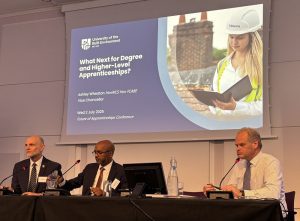Modular ‘hop-on, hop-off’ apprenticeships will solve UK skills gap
Posted on: 11 July, 2025


The University of the Built Environment’s Vice Chancellor, Ashley Wheaton, has urged the sector to let learners flexibly pause and restart their degree and higher-level apprenticeships so the built-environment industry can plug its significant skills gap and hit ambitious national house-building and infrastructure targets.
Speaking at Westminster Insight’s Future of Apprenticeships conference, Ashley argued that the current ‘all-or-nothing’ model fails employers and apprentices alike.
“Everything that isn’t the end-point assessment within the allowable time is seen as a failure,” he told delegates. “We would love to see more recognition of success at the levels below degree.”
The ‘hop-on, hop-off’ model
 Ashley’s solution is a modular “hop-on, hop-off” apprenticeship that awards formal qualifications at set milestones.
Ashley’s solution is a modular “hop-on, hop-off” apprenticeship that awards formal qualifications at set milestones.
“Why shouldn’t apprentices pause at Level 4, gain practical industry experience for two years, and then return to complete their degree?” he said.
The Vice Chancellor knows the system inside out: the University of the Built Environment already runs fully online apprenticeships for 2,600 learners in partnership with 700+ employers. From that vantage point – plus his seat on the Deputy Prime Minister’s Construction Skills Mission Board – he highlights the urgent need for intermediate skilled professionals – including assistant quantity surveyors, site technicians and cost analysts – if the Government’s five-year building plan is to succeed.
Why flexibility matters
Under the current framework, an apprentice who leaves early or narrowly fails the end-point assessment walks away with no formal credential, even after mastering years of technical content. Modular progression would let employers deploy part-qualified staff in intermediate roles while giving apprentices a clear route back to full chartered status when the time is right.
 Ashley also pressed professional bodies to modernise their accreditation routes.
Ashley also pressed professional bodies to modernise their accreditation routes.
“Degree and higher-level apprenticeships are uniquely positioned to respond to the built-environment sector’s pressing skills challenges, but the current system must evolve,” he said.
A roadmap for reform
Ashley’s call echoes broader moves toward flexible apprenticeships, already being piloted by the Department for Education in other industries. By building in modular exits and re-entry points, the sector could plug the shortfall of skilled and technical professionals it needs today and still guide them – step by step – towards full professional degrees tomorrow.
He said: “Embracing greater flexibility and recognising intermediate achievements will be essential if we are to equip our sector with the skilled professionals and technical experts it urgently needs.”
Find out more about the University of the Built Environment’s Apprenticeship Programmes.



